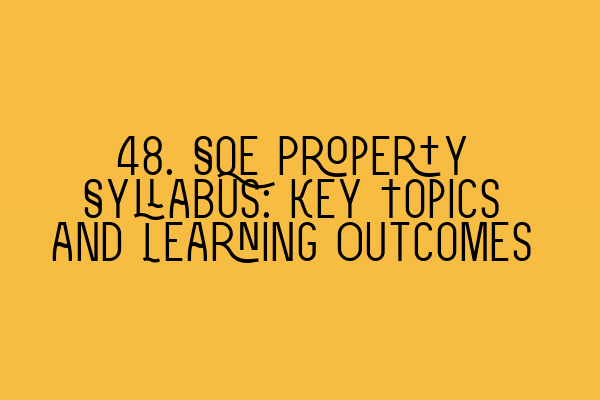48. SQE Property Syllabus: Key Topics and Learning Outcomes
At SQE Property Law & Land Law, we understand the importance of providing comprehensive and up-to-date information about the SQE (Solicitors Qualifying Exam) to aspiring solicitors. In this blog post, we will delve into the key topics and learning outcomes of the SQE Property syllabus. Whether you are preparing for the SQE 1 exam or the SQE 2 exam, this article will serve as a valuable resource for your studies.
SQE Property Syllabus: What to Expect?
The SQE Property syllabus covers a wide range of topics related to property law, including freehold and leasehold interests, mortgages, easements, covenants, landlord and tenant law, and more. It is essential for aspiring solicitors to have a solid understanding of property law as it plays a crucial role in many legal matters.
Here are the key topics covered in the SQE Property syllabus:
- Freehold and Leasehold Estates
- Co-ownership and Trusts
- Mortgages and Securities
- Easements and Profits à Prendre
- Covenants
- Tenant and Landlord Law
- Land Registration and Title Guarantees
- Dispositions of Registered Land
- Deeds
- Conveyancing
These topics are carefully selected to ensure that aspiring solicitors have a comprehensive understanding of property law principles and are prepared to handle legal matters related to property transactions.
Learning Outcomes for SQE Property Syllabus
Upon completion of the SQE Property syllabus, aspiring solicitors will be expected to:
- Demonstrate a solid understanding of the various types of freehold and leasehold estates and the implications of each.
- Explain the principles and rules related to co-ownership and trusts.
- Understand the legal concepts and practical implications of mortgages and securities.
- Identify and analyze easements and profits à prendre.
- Advise on the nature and enforceability of covenants.
- Apply the relevant laws and regulations to resolve tenant and landlord disputes.
- Understand the principles and procedures involved in land registration and title guarantees.
- Handle dispositions of registered land and draft deeds accordingly.
- Apply conveyancing principles and procedures in property transactions.
- Confidently navigate through property-related legal matters and provide effective legal advice to clients.
By achieving these learning outcomes, aspiring solicitors can demonstrate their competence in property law and be well-prepared to tackle the challenges they may face in their legal careers.
Preparing for the SQE Property Exam
To excel in the SQE Property exam, it is crucial to have a structured study plan and access to reliable study materials and resources. At SQE Property Law & Land Law, we offer comprehensive SQE preparation courses designed to help you succeed in the exam.
Our courses cover all the key topics of the SQE Property syllabus and are delivered by experienced solicitors and legal professionals. We provide in-depth explanations, practical examples, and interactive learning tools to enhance your understanding of property law concepts.
In addition to our preparatory courses, we recommend practicing with SQE 1 practice exam questions and SQE 1 practice mocks FLK1 FLK2 to familiarize yourself with the exam format and assess your knowledge. These resources can be invaluable in honing your exam techniques and identifying areas that require further study.
To stay updated on the latest SRA SQE exam dates and other important information, check out our article on SRA SQE Exam Dates.
Investing time and effort into preparing for the SQE Property exam will not only increase your chances of passing but also equip you with the necessary skills and knowledge to excel in your future legal career.
Enroll in our SQE 1 preparation courses or SQE 2 preparation courses today and take the first steps towards becoming a qualified solicitor.
